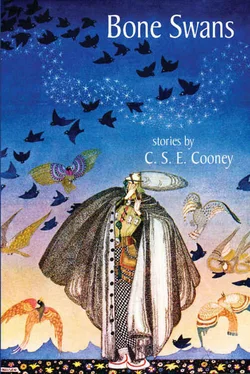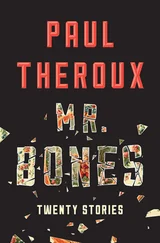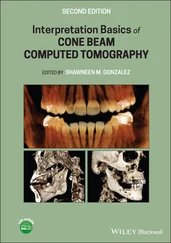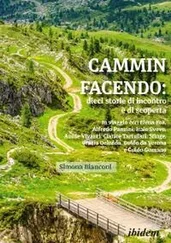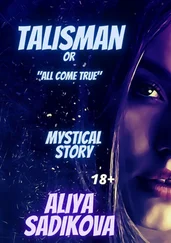“I can’t—I can’t go with you. I don’t want to use up my last chance. I’m not ready! I’m not happy yet.”
“Hush, it’s all right.” Beatrice spoke in the voice she’d used whenever Granny Two-Shoes woke her up with a midnight crying jag. Granny did not wake often, but when she did, it was bad. She cried like she was the last little girl left alive in the whole wide world. “It’s all right. I can go by myself.”
Leaving Rosie Rightly hunched on the low hill, hands clasped over the radiant wounds on her wrists, painted head bowed, Beatrice descended.
The incline had quickened her pace, or perhaps it was her body that seemed to grow lighter. The stone elephants were the first beautiful things Beatrice had seen in the Big Bah-Ha. Regal and welcoming, they seemed to smile. They made her stand straighter and remember one of Dad’s favorite words. Dignity. Right up to the mirror she walked, patting a huge hoof nail on her way, and stared into it.
At first she saw only a crack. It was small, a golden ribbon against the gray. Dancing light reached out from the crack and tickled her face like a breeze. It gladdened her eyes, made her skin feel a flush of true warmth. She wanted to put her mouth to the crack and suck the joy all the way into her. Put her ear to it and hear Dad’s voice again. Because he would be there, where the gold was. She knew he would.
But Beatrice thought, No. I must focus. I must look at myself. So she took a half step back.
And cried out at the dead thing she saw.
She was really, truly dead. Cold, small, lightless, breathless, heartless, quenched. Indistinguishable from anything else that had ever lived and died. There was nothing luminous about her except the ugly red handprint mantling her gray face like some hellish lobster. Beatrice scratched it. She scraped and clawed, but the handprint would not come off, and Beatrice fell to her knees and covered her eyes so that she would not have to bear herself, her dead self, her never-to-be-anything-else-ever-again self, one second longer.
A gentle hand touched her shoulder. It’s Dad , she thought, and flung herself into his arms. She pressed her face into his silver scales, sobbing without tears.
“Oh,” she said a moment later, edging away. “Sorry.”
“Do not be ashamed,” the creature answered. “I am here to succor you.”
“You’re the Gray Harlequin.”
“Yes.”
Slim and supple as the Flabberghast, not quite as tall perhaps, but tall enough. Skin that glittered as if a million silver sequins overlapped him. A black velvet ribbon wrapped the upper part of his face like a bandit mask—only it had no slits for eyes.
Beatrice wasn’t sure he had eyes, although she felt certain he was watching her. A cloth of diaphanous saffron silk wound his body like a toga, clasped at his left shoulder by a glass bird that glowed from the white light inside it, and knotted into a saffron rose at his right hip. The rest billowed to his feet.
The crown upon his brow was part thorn, part berry, part leaf-bell-branch-bird’s-nest, part flower, part pale pink seashell. Wings grew from it, and antlers, and the soft ears of some small brown creature. This must be, then, what Rosie Rightly had called the August Crown. It proclaimed the Gray Harlequin Lord of the Big Bah-Ha. King of Clowns.
To see that crown was to feel its weight. Beatrice fell to her knees, thinking even as they scraped down, I never kneel. Not in defeat. Not to anyone. I pummeled Aunt Oolalune when she tried to make me. Why now?
“Do you come to ask a boon, little one?” The Gray Harlequin’s voice was warm as maple-flavored corn syrup on a cold December morning.
“I want to leave.” Beatrice spoke to the ground, hating herself for muttering. “I want to see my dad. I don’t want to stay here anymore.”
The Gray Harlequin made a sound between a cluck and a tsk. She risked a look up at him. He shook his glittering head to and fro.
“I am afraid,” said he, “that rules are rules. You looked into your own face, but you did not laugh. The best I can offer you now is a place here in Chuckle City. You might join the tramps under the Big Top. Ride the tigers. Learn to walk the wires.” He chuckled. A splatter of hot syrup. Bodies falling from a burning building.
“Or perhaps the Eleven Lovely Emilies will take you up, up, up into their webs and teach you how to spin. How to measure time by a red hourglass. How to eat what falls into your snares.” He stooped to cup her chin before she could jerk away. “Or you can blow balloons with the rustics, or immolate yourself with the grotesques. Although, from the look of you, I’d say you’ve seen enough burning.”
He laid his hand over the handprint on her face. She could feel the fit, how his fingers conformed to the slaprash’s shape exactly. This time, Beatrice did flinch, but he grasped her by the jaw and did not let her go.
“But you cannot leave my city, little Beatrice,” said the Gray Harlequin. Beatrice closed her eyes when he smiled. “And you cannot move forward through the mirror. Unless you want to take another look? Go on. Of all the children who have passed through the Big Bah-Ha, surely you are neither the most wretched, nor the saddest. Go on.” His ruby lips curled like vipers. “Look. And smile at what you see.”
It was a dare and a command. Releasing her jaw, he flung her forward. Beatrice dragged herself to her feet, pressed both fists to the glass, leaned in, looked. Her reflection sprang at her like a monster. She flung herself back, once again tearing at the slaprash on her face, trying to dig it from her flesh.
“Make it go away!”
“That,” smiled the Gray Harlequin, “I can do.”
So he pressed her once more to her knees, and she went, docile now. And he smeared white paint on her dull gray face, and painted a single blue tear beneath her right eye to represent all the tears she could no longer cry. From his saffron robes he drew a round red sponge attached to two white strings, and he placed the sponge over her nose and knotted the strings behind her head. He told her to look into the mirror a third time, now that he had made all things well.
Beatrice obeyed. Her reflection had grown bearable, although in wearing the red nose, she could no longer smell the warm gold wind pouring through the mirror’s cracked surface. She reached up to unknot the strings that held the nose affixed. The Gray Harlequin slapped her hand.
“Now, Beatrice. That’s no way for a clown to behave!”
Once more he began securing the strings behind her head, but before he had quite finished, the Gray Harlequin gave a loud shout and jumped back. The red nose tumbled from her face. Beatrice made only a half-hearted attempt to catch it, ashamed for being so relieved at its absence.
Above her, the Gray Harlequin hissed, shaking out his hand like it had been stung.
A sharpened shell casing bounced off Beatrice’s foot. She began to smile. Then the sky opened.
Overhead, thirty-three ravens exploded into being. Dropping to the ground around the Gray Harlequin so quickly they drew from the air a thunderclap, they threw back their gray feathers and became young men. Hangman’s hoods were thrust back, revealing ivory eyes and ebony teeth and coxcombs that writhed like Medusa’s snakes. Instead of clothes, their bodies were wrapped like mummies in gaffer’s tape. One wore half of a pair of handcuffs like a bracelet. Another, a length of heavy chain for a belt. Their throats were as radiant a red as Beatrice’s nose, red as the wounds on Rosie Rightly’s wrists.
“Well?” asked the Gray Harlequin. “Where is my meat and drink? In all of Chuckle City, did not one of my little subjects relinquish their last hope?”
Читать дальше
